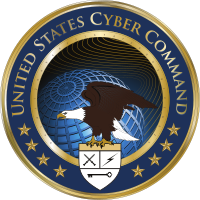
Photo from wikipedia
Much used, although often little understood, the terms ‘cyber warfare’ and ‘cyber conflict’ litter the Internet and the print media in the guise of a variety of revelatory exposes, confessions,… Click to show full abstract
Much used, although often little understood, the terms ‘cyber warfare’ and ‘cyber conflict’ litter the Internet and the print media in the guise of a variety of revelatory exposes, confessions, exclusives and alarmist headlines. In short, cyber conflict entails activities – at either the state or sub-state level – whereby attempts to damage an adversary through attacking computers, information networks or any other facet of the modern Information Technology (IT) society. Understanding Cyber Conflict represents an attempt to assess current debates and past and future developments. This anthology, edited by George Perkovich and Ariel E. Levite, examines how governments are struggling with the unprecedented role of cyber issues as countries face threats with thievery, subversion, terrorism, covert operations and warfare. With 14 chapters by government officials and scholars from Israel, Switzerland, the United Kingdom and the United States, the book presents historical analogies to provide insight into the capabilities, risks and preventative abilities of cyber technology. George Perkovich and Ariel E. Levite’s ‘Introduction’ explains how vital it is to understand the benefits and pitfalls of cyber technology by discussing historical cases of new technology shaping weaponry, war and preventing conflict. They argue, ‘To realize its benefits, and to minimize the technology’s destructive potential, the widest possible range of societies and states must learn to steward it wisely’ (p.13). Through historical analysis of earlier technologies, the authors shed light on military-technological issues surrounding the use of cyber weapons, how effective they could be in a war and preventing cyber conflict.
Journal Title: Intelligence and National Security
Year Published: 2018
Link to full text (if available)
Share on Social Media: Sign Up to like & get
recommendations!